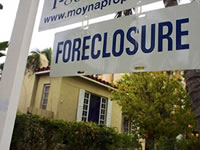Mortgage Modifications
News Items
Most mortgage modifications doomed to failure
by Broderick Perkins
(06/20/2010) A mortgage modification doesn't come with a guarantee that it will save your home.
Chances are, the same conditions that make it tough for you to afford your mortgage payment, also force you to stretch to pay other bills.
If that's the case, a mortgage modification alone won't be enough to bail you out of your financial hardship.
That doesn't mean you should forego a modification. It means you should have a full grasp of what you may need to do beyond a mortgage modification to keep your home and your house in order.
Global rating agency Fitch Ratings recently reported that mortgage modifications are likely to fail 65 percent to 75 percent of the time within 12 months, because other debts owed by the homeowner remain in place and untouched.
A mortgage modification occurs when the lender reworks the terms of an existing home loan, typically to lower payments and make the home more affordable. To get the payment down, lenders lower the interest rate, extend the loan term, reduce the principal or use any combination of those approaches.
Since the onset of the Obama Administration's Home Affordable Modification Program (HAMP) approximately 300,000 of a potential 2 million eligible homeowners have received permanent mortgage modifications of the federal program.
A similar amount of modifications have been completed under other programs.
While the HAMP program and others come with a round of mandated counseling that includes budgeting, planning and wise credit use, it does nothing to directly address other debts homeowners may be suffering.
The modifications cut homeowners' monthly mortgage debt by an estimated $550 or more and it reduces housing expenses to 31 percent of net income.
However, because of other debts, including auto loans, credit cards and other household expenses, homeowners spend an estimated 64 percent of their net income before they go food shopping, according to Fitch.
Small emergencies, say, an auto repair bill, medical bill, even a temporary loss of some or all income can sink mortgage modification homeowners who don't have cash reserves.
The Mortgage Bankers Association revealed similar findings over the course of several years -- mortgage modification default rates from 40 percent to 60 percent.
Fitch also reported moratoriums and mandated mediations can help some homeowners prolong the inevitable or get through hard times with homeownership intact.
Federal and local government moratoriums will delay final resolution on many properties until 2012, Fitch said. That means distressed sales will maintain a toehold in the housing market for at least another two years -- more by some estimates.
Homeowners can consider the ever more popular short sale alternative to foreclosures. Foreclosures often follow failed modifications.
Fitch reported half of prime borrowers who lose their homes now do so through short sales -- selling a home for less than the amount owed. Among the short sales are also deed-in-lieu sales, a transaction where the bank repossesses the property and forgives any balance.
Both modifications and short sales can negatively impact a consumers credit standing, but often not as badly as a foreclosures.
The Fitch findings underscore the importance of paying off debt, carrying as little credit as possible and living within one's means.
Other related articles:
PreventLoanScams.com coalition goes after mortgage modification fraud
Bank of America, Flagstar to Offer Mortgage Programs for Unemployed Borrowers
Part 1 of 2: Underwater? Walking away from your mortgage could really sink you
Harp Could Be Music to Homeowners' Ears
Refinance at Today's Low Rates!

